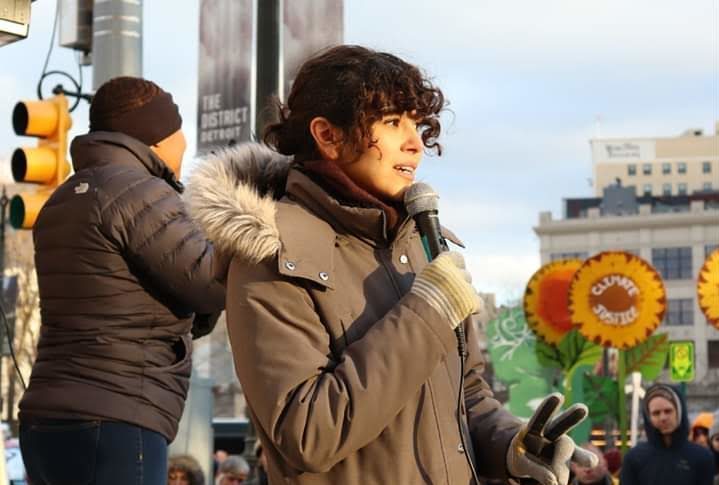
In February 2021, Detroit’s Michelle Martinez was excited like she hadn’t been in years about the potential of progress on core environmental and climate justice issues.
President Donald Trump, who took the U.S. out of the Paris Climate Accords and was rolling back Obama-era environmental protections, was out of office. Incoming President Joe Biden had campaigned on an aggressive climate and environmental justice agenda.
Martinez was executive director of the Michigan Environmental Justice Coalition, and she told Great Lakes Now that it was time to “get excited” about Biden’s agenda. She spent the next 10 months pushing for its implementation then took a sabbatical to “rest and reconnect” with family.
Martinez stepped down from her executive director position, but she remains on the board of directors of MEJC. She is now a visiting scholar at the Tishman School of Environment and Design at The New School, a private research university in New York City, where she will work on energy justice and strategy development for frontline activists. In addition, Martinez is writing a climate and justice column for Planet Detroit.
Great Lakes Now’s Gary Wilson recently spoke with Martinez about President Biden’s environment record to date, where he has delivered and where he has come up short.
Similarly, Martinez commented on Gov. Gretchen Whitmer’s climate plan, which she said was more like an aspirational framework that will require a big priority shift by the Michigan legislature and the Department of Environment, Great Lakes and Energy.
Martinez also commented on the role of electric vehicles in Michigan’s climate plan, water affordability and environmental justice for Benton Harbor.
The interview was conducted by email and on the phone and was recorded and edited for clarity and length.
Great Lakes Now: We spoke in February 2021 just a few weeks after President Joe Biden took office. You said it was time to “get excited” about Biden’s proposed environmental justice initiatives and their potential impact on predominantly Black and Brown communities. Was your excitement warranted? Has he delivered?
Michelle Martinez: I think everyone was excited after Trump, and with Biden some of the pieces we had hoped for have materialized, but many have fallen short. For example, stopping the Keystone XL Pipeline and halting drilling in the Arctic were important pieces to the climate puzzle. But there are other things he fell short on, like ordering an Environmental Impact Statement for Enbridge Line 3, or increasing liquefied natural gas exports when we have three years to phase out fossil fuels. Grist has an amazing tracker of the rollbacks of Trump-era policy. Biden has reversed less than one-third on environment and health rules and less than half of Trump-era climate rules. He can do better.
On a positive note, just this week President Biden used his executive authority to invoke the Defense Production Act to triple solar production by 2024, increasing the reliability of the supply components. But it does come with some false solutions that may only extend fossil production, like carbon capture and hydrogen.
But the biggest piece environmental justice advocates have been pushing forward is the Justice40 Initiative — President Biden’s promise to deliver at least 40% of the overall benefits from federal investments in climate and clean energy to disadvantaged communities. We are still waiting to see if those initiatives will have a measurable impact on the scale of the crisis, and time is simply running out.
GLN: In the 2021 interview, you expressed optimism about the potential of “water as a human right” legislation advancing that was introduced by Rep. Rashida Tlaib. Water affordability and ending shut offs are important issues for many Detroit residents. But nothing materialized from her initiative. The moratorium on shut offs could end later this year. Is there hope for action before then?
MM: Rashida Tlaib is a champion for environmental justice in every way from lead issues to affordability to protecting our communities from flooding, but what we are seeing from Congress is a failure in leadership on climate, water, utilities, gun control… We can go on.
And this is most evidenced from the lack of movement on the Build Back Better Act which crumbled under the pressure of Sen. Joe Manchin. Progressive Democrats were trying to hold the line, but efforts failed and we got a big spending package, but it didn’t meaningfully address climate. This is no doubt in response to the influence that fossil billionaires and lobbyists have on the political system.
GLN: While President Biden’s climate initiatives have stalled in a sharply divided Congress, Michigan Gov. Gretchen Whitmer released her climate plan earlier this year. It calls for carbon neutrality by 2050 but is short on details and remains aspirational. What’s your take on Whitmer’s plan? Is striving to be carbon neutral enough?
MM: The climate plan that Whitmer has put forth is an important step in making sure Michigan is on the map for climate. But the actualization of this plan will require a complete shift by the Michigan legislature and departments like the Public Service Commission and the Department of Environment, Great Lakes and Energy. It may even require a constitutional change to force corporations to pay their fair share.
Many of the targets in the plan are either procedural or aspirational and will need to be institutionalized aggressively. Some aspects, like carbon capture and storage need to be left behind, again false solutions.
I would argue that until we get the influence of DTE, Consumers Energy and other corporations out of our democracy, we won’t have meaningful gains on climate, especially not for Black, Indigenous people, rural, working class families.
It’s going to take a few things to accomplish the bold goal of saving life on this planet: billions of dollars to renovate homes, update the grid, enrich the local food economy, create comprehensive affordable transit, and do it all equitably for all people. Instead the oil and gas industry, like Enbridge with Line 5 or DTE’s push to fossil gas, are forcing another generation of fossil energy and expecting everyday working people to clean up their mess with public dollars that should be going to schools and healthcare. Frankly, our livelihoods are being traded off for corporate profit.
Whitmer’s Climate Plan is a framework for moving forward, but implementation will require a huge lift from the legislature. For the audience, there is no greater task than supporting candidates who are climate justice champions right now – knocking on doors, donating, and then holding them to their promises when they get into office. People like Rashida Tlaib, Andy Levin, Yousef Rabbi, Stephanie Chang, Abe Aiyash, all need your support.
GLN: The Detroit auto industry with support from the state is fixated on transitioning to electric vehicles as the centerpiece to combat climate change. But New York Times columnist Farhood Manjoo says the problem isn’t just “gas-fueled cars, but car-fueled lives.” Electric cars are still cars, Manjoo says. Does he have a point that EVs are no panacea?
MM: That’s right, this is an all-hands-on-deck moment, and everything needs to change from affordable housing and sustainable urban planning to comprehensive ecological education, to political power and democracy. Getting ready for climate disaster is not a spectator sport, and we should not assume that the automakers or the utilities will be our saviors — it is simply outside of the interests or will of shareholders and bank investors.
In southeast Michigan we are still getting more than 85-90% of our electricity from dirty energy sources like coal, gas and nuclear, which emit greenhouse gasses over the Great Lakes. EVs will simply be chugging on a different kind of fossil energy than crude oil if that trend continues.
So when our monopoly investor-owned utility, DTE Energy, was asked to vote to quantify how much methane will be emitted from their gas portfolio, they voted against measuring it. Again, techno-fixes are just tools amidst a comprehensive transformation, and it’s just one tool. Tools like any tool are limited to their utility and can be misapplied. Instead of asking “Will this reduce CO2?”, instead ask “Will this transform our society to save life on Earth?” In this way EVs can be contextualized within the scope of the problem.
What climate justice activists do want are equitable solutions for working families who can’t afford an EV, and we want union jobs to stay in Michigan.
GLN: Gov. Whitmer also made environmental justice a priority after taking office. But Detroit environmental law attorney Nick Leonard recently told Great Lakes Now that her administration has been focused on process and hasn’t delivered outcomes. That’s led to an EPA intervention in Benton Harbor and civil rights complaints. How do you grade the governor on environmental justice?
MM: There are many different forms of justice. Procedural justice, which focuses on the processes and procedures by which policies are institutionalized and governed, can only take us so far — that’s largely what we’ve seen. Whitmer has put us on a path, but we need action. If we don’t have the resources, the structural conditions for change and the political will, then these advisory boards and public hearings go nowhere.
Sadly, with this imbalance of procedural foci with no corrective or distributional justice, the result is actually the reverse of the intent – a deepened disenfranchisement of Black communities and other underrepresented groups from the political process.
What places like Flint, Detroit, Benton Harbor, Tribal leaders, rural communities and others are asking for is beyond “meaningful engagement,” but political, material and structural change. When we see EGLE start denying permits for industry based on health outcomes, community-owned solar installation, repeal of emergency management, or when laws are passed that protect renters from utility shutoff or gentrification, I think that’s when we will be saying, yes, we see progress.
GLN: With President Biden’s climate plans in limbo and the country’s political spotlight now on rampant gun violence and inflation, you wrote a commentary for Planet Detroit that equated the lack of action on climate change to the lack of action on gun control. Can you elaborate?
MM: First I want to acknowledge the deep pain and grief that people are feeling right now in the face of such horrific gun violence. It’s unthinkable to lose elders and children in an act of preventable violence. As the world has witnessed time and time again with these mass shootings, what gun violence does is create a culture of fear. But I think more and more people are saying no to the powerful forces that enable these violent acts and against those who actually benefit from them.
It’s time to name names, real people behind the arms industry that benefit from the proliferation of guns – Ted Cruz among them – and those people need to be held accountable. Did you know that each time there is a mass shooting, there is a surge in stocks for gun manufacturers? In just two days after the incident at Uvalde, gun and ammunition companies’ stocks surged 6-12%. As many politicians know, there is a lot of money to be made in mass death.
But this is the same trend in fossil investments. Pretty much every scientist in the whole world is telling us we must halt all new fossil fuel production, and with each IPCC report, the alarm bell rings louder as people lose their lives from climate-related disasters.
Rainforest Action Network and Indigenous Environmental Network did this great report. From 2016-2020 the banking industry — led by JPMorgan Chase – invested $3.8 trillion dollars in fossil fuel financing, making a mockery of climate science and the global community who are pleading with decision-makers to reign in their reckless behavior.
I, like so many others, was utterly shook by the courage of the parents challenging the police to save their children in Uvalde. And I find hope when I see courageous people all over the world standing up, doing the same thing and saying no more mass death — no more guns, no more oil, not our kids, not our communities, not our precious forests and lakes, no more. These power systems that maintain a culture of mass death must be dismantled, and only we can do it.
GLN: Another citizen lawsuit was recently filed against state of Michigan and Benton Harbor officials over drinking water quality. While Michigan settled with Flint residents, there is still a federal lawsuit pending against the U.S. EPA over Flint. How does the state get out of the environment of repeated legal action based on drinking water quality that has spanned two administrations?
MM: The residents of Michigan deserve the best, state of the art, clean and affordable drinking water, and the transparent democratic processes that can restore trust in local and democratically owned water systems. We are a Great Lakes state and proud of it.
Reports are indicating that lead service line replacement should be completed by spring of next year, but Benton Harbor residents are still on bottled water and filters in their homes. According to Nick Leonard at the Great Lakes Environmental Law Center, there are still drinking water violations for bacteria without alerting residents. Filters aren’t certified for bacteria. How can a parent fully be confident to give their kids, or elders that water from the tap?
What’s at stake here is trust in our public water. We need public water systems because they are regulated for quality, for cost, and have regulatory requirements in place from the Clean Water Act.
What happened in Detroit during bankruptcy was the regionalization of water governance, leaving Detroit, the host municipality, as the minority vote in the Great Lakes Water Authority. The narrative here is that Detroit can’t govern, and it perpetuates a larger racialized narrative we saw emerge during the emergency management takeover — majority African American cities can’t govern. It’s totally false and does not recognize the impact of capital flight, redlining and mass disinvestment over generations.
Make Benton Harbor whole, make Detroit whole, and fund public water systems as a value set to our democracy.
Catch more news at Great Lakes Now:
Water Always Wins: “Quietly radical” book makes case for Slow Water
Water executive tells cities to “get creative” when it comes to replacing lead service lines
Featured image: Michelle Martinez (Credit: Valerie Jean via Michelle Martinez)




